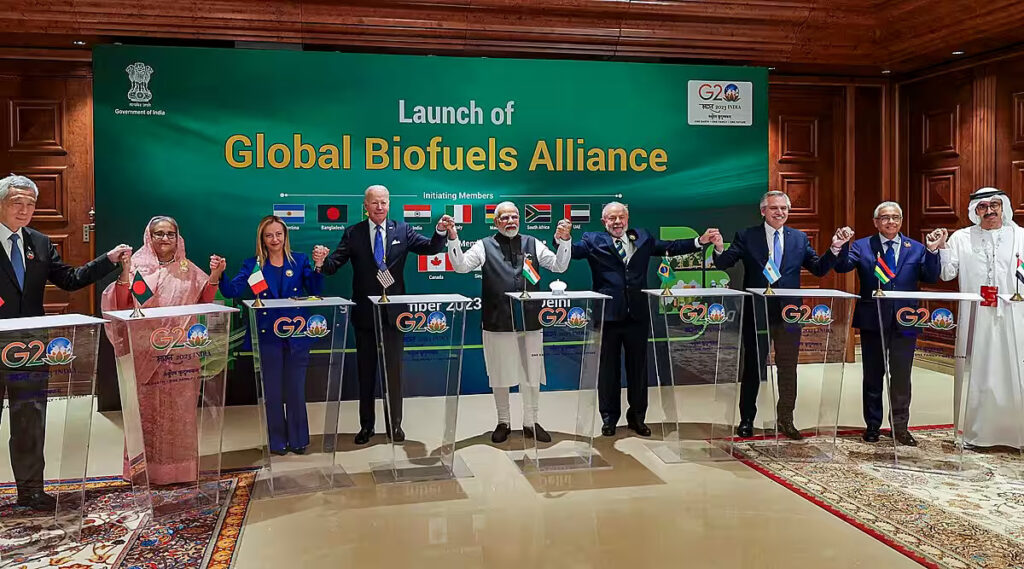
- The Global Biofuel Alliance would greatly benefit developing nations in reducing their carbon emissions and gradually transitioning to a more cost-effective, efficient, and cleaner means of energy.
- The Alliance focuses on securing a steady supply of biofuels—which are a cheaper and much cleaner alternative to traditional fossil fuels, and developing sustainable production methods.
- The Global Biofuel Alliance spearheaded by India, paves the way for other developing nations to join the efforts in combating climate change and bolstering equitable economic development.
The G20 Summit provided a significant platform for India to portray its grandeur and accomplishments to the most powerful economies in the world. The 3-day summit successfully paved the way for several crucial dialogues to strengthen international relations through the inclusion of the African Union to G20, the introduction of the Global Biofuel Alliance, and the signing of the New Delhi Declaration, among others. This article will illustrate the Global Biofuel Alliance and its significance to India to further establish its position as an upcoming superpower in modern global society.
The Global Biofuel Alliance, first introduced in February 2023 by Hardeep Singh Puri (Minister of Petroleum and Natural Gas), aims to provide a platform for international cooperation in developing biofuel technologies to further accelerate the production and consumption of biofuel-based energy as an alternative means to clean and sustainable energy resources.
The Global Biofuel Alliance, spearheaded by India, the US, and Brazil, currently consists of 19 countries and 12 international organisations, including the World Bank, World Economic Forum, and International Renewable Agency.
The Alliance, spearheaded by India, the US, and Brazil, currently consists of 19 countries and 12 international organisations, including the World Bank, World Economic Forum, and International Renewable Agency. It would also collaborate with international initiatives such as the Clean Energy Ministerial Biofuture Platform, the Global Bioenergy Partnership, and the Mission Innovation Bioenergy Initiatives. The Alliance focuses on securing a steady supply of biofuels—which are a cheaper and much cleaner alternative to traditional fossil fuels, developing sustainable production methods, and lastly, promoting a global outreach to commit to sustainable means of fuel.
Currently, India, the US, and Brazil constitute the majority of both producers and consumers of biofuels, contributing to a total of 85% share in production with around 80% in consumption of biofuel. India, the world’s third-largest consumer of crude oil—depending on around 85% of imports for its domestic requirements, could largely benefit from the alliance.
As stated by Hardeep Singh Puri, most of the ethanol production in India is sourced from sugarcane and crop stubble remains, which usually end up in smoke during the later months of the year when stubble burning wreaks havoc in the northern states of the country. The global ethanol market was valued at around USD99 billion in 2022, which is projected to cross over USD160 billion by 2030. Noting its immense potential as the world tries to move farther away from fossil fuels, the Global Biofuel Alliance is being hailed as a watershed moment in the quest for a sustainable future.
The Alliance consists of 19 countries and 12 international organisations and would also collaborate with the Clean Energy Ministerial Biofuture Platform, the Global Bioenergy Partnership, and the Mission Innovation Bioenergy Initiatives.
Although the Alliance was a joint effort by three nations, India’s initiation and zeal to spearhead the movement has been appreciated by global leaders. While the movement aims to encourage collaboration and cooperation amongst all nations, it is imperative to note that the Alliance would greatly benefit developing nations in reducing their carbon emissions and gradually transitioning to a more cost-effective, efficient, and cleaner means of energy.
In conclusion, it is worth noting that India’s stance as an emerging superpower despite being a developing nation strengthens its position as a global leader, paving the way for other developing nations to join the efforts in combating climate change and bolstering economic developments.
(Shubhangi holds a master’s degree in International Relations from the Queen Mary University of London. She has authored articles on India’s vaccine diplomacy and the politics of gun reform in the US. Views expressed are author’s own)
